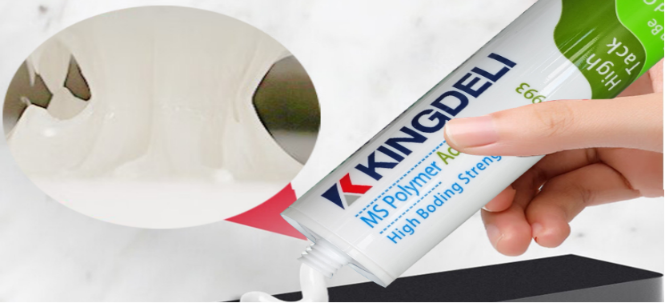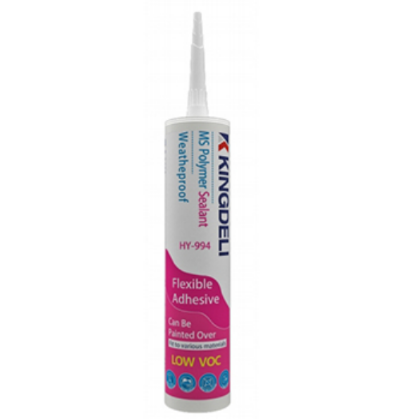Best MS Sealant for Automotive and Industrial Repairs


Introduction
When you work on cars, trucks, or heavy equipment, the sealant you choose plays a bigger role than most people think. A weak bond can lead to water leaks, rattling noise, or even full part failures that cost far more to fix later. In workshops, saving time is key, so you need a product that performs well from the start. That’s why MS sealants are now seen as one of the most reliable options. They give you strong sticking power, good stretch, and long service life, all in one tube.
If you have used polyurethane or silicone in the past, you may notice that MS sealants take the useful parts of both. At the same time, they avoid many of the usual problems. This makes them especially valuable in repair shops, assembly lines, and factories.
If you are checking brands, Kingdeli is a trusted manufacturer with more than two decades of production experience. The company offers sealants for building, automotive repair, and industrial work. Their MS sealants are tested in tough conditions so you can rely on them in real projects, not just on paper.
What Makes MS Sealant Different
Core Material Properties
MS sealant is a type of polymer that cures when exposed to air moisture. Once it hardens, it becomes a flexible yet tough rubber like material. This means it bends with parts instead of cracking. It also absorbs vibration, which is especially helpful inside engines or around moving equipment. For jobs where both strength and flexibility matter, MS sealants deliver a balance that older materials sometimes cannot provide.
Comparison to Polyurethane Sealants
Polyurethane has long been a standard in auto shops and construction. It bonds well and has strong abrasion resistance. Still, it can fade or weaken if exposed to direct sunlight without additives. MS sealants solve this by offering better UV resistance, steady curing even in wider weather ranges, and smooth finishes without bubbles. For technicians working outdoors or in open workshops, this stability makes daily tasks easier.
Comparison to Silicone Sealants
Silicone is famous for being waterproof and holding up to heat. But silicone often fails to bond well with painted metal or some plastics. MS sealants grip steel, glass, aluminum, and coated panels directly, no primers needed. That saves you one extra step in the process. They are also paintable, so you can match the finish after repair without odd shiny seams.

Key Benefits in Automotive Repairs
Windshield and Glass Bonding
When setting windshields or windows, you need a sealant that stops water while holding glass in place under shocks. An MS adhesive provides both. The layer keeps out rain and wind yet allows small movements without peeling. It can also be painted after curing, which is helpful when finishing the surrounding panel. Car detailers often appreciate that the sealant blends into the frame, giving a neat result.
Body Panel Sealing
Car body seams and door frames face constant vibration and sudden temperature changes. MS sealants flex with these shifts while staying bonded. Unlike brittle fillers, they do not form hairline cracks. That helps reduce rust, which is a common long term issue in older cars. If you manage a repair shop, this difference can lower customer complaints about repeat leaks or squeaks.
Under the Hood Applications
Engines create heat, vibration, and contact with fluids like oil or coolant. An MS sealant can tolerate these challenges. Since it does not shrink, it keeps a tight seal even after months of use. The low odor makes it more comfortable for workers during application. Mechanics often prefer it because it is easier to handle than many older adhesives that give off strong smells.
For demanding automotive tasks, HY-993 High Strength MS Polymer Adhesive Sealant is designed for heavy bonding where both toughness and flexibility are needed.
Benefits in Industrial Repairs
Heavy Equipment and Machinery
Industrial machines often run for hours without breaks. They face dust, shocks, and oil contact daily. MS sealants provide sealing and bonding in one step, reducing downtime from repeat fixes. For businesses, less downtime means higher productivity and lower service costs. A single repair that holds up longer saves both money and trust.
Metal and Concrete Joint Sealing
Factories and workshops often have joints between concrete floors and steel frames. Polyurethane has been used for years, but it may age quickly in strong sunlight. MS sealants last longer outdoors and keep their strength even when exposed to weather. This helps in warehouses, outdoor storage, or loading docks where sunlight and rain are common.
Electronics and Appliances
Some production lines need adhesives that don’t release harmful fumes. MS sealants are low-VOC and low-odor, which makes them safe indoors. They also resist yellowing, which matters when sealing visible parts in appliances. That’s why MS sealants are being used more in home electronics assembly and appliance repair.
For general industrial use, HY-994 All Purpose MS Polymer Sealant is very practical. It bonds metals, plastics, glass, and wood, so you can cover many jobs with one product.
Practical Factors You Should Pay Attention To
Application Ease
MS sealants are usually sold as single component cartridges. You don’t need to mix two parts. Just load it in a caulking gun, apply, and let the air moisture cure it. This lowers errors and makes the job faster, which is valuable for both busy workshops and home projects.
Paintability and Finish
Many silicone sealants can’t be painted, leaving a glossy strip that looks out of place. MS sealants can be painted after curing. This is helpful in cars, machines, and even building repairs where appearance matters. No one wants visible seams breaking the clean look of a finished job.
Long Term Stability
Tests show that MS sealants resist tearing, chemicals, and weather. They keep their bond for years, even under daily stress. This makes them cost effective because you won’t need to reapply as often. In industrial settings, using a stable sealant also improves worker safety by lowering the chance of leaks.
About Kingdeli
Kingdeli has more than 20 years of experience in adhesives and sealants. Based in China, the company supplies global markets with products that meet strict quality and eco standards. Their MS polymer range includes eco friendly sealants that still give high strength and flexibility. This mix of safety and performance has helped Kingdeli gain trust in both automotive and industrial sectors.
If you want more product details or help with choosing, you can reach out directly through the contact page.
FAQ
Q1: What materials do MS sealants bond best with?
A: They stick well to metals, plastics, glass, and wood. Unlike some products, they don’t need primers. This saves you time and steps in both repair and production.
Q2: Can MS sealants handle outdoor use?
A: Yes, they resist sunlight, rain, and changing weather. This makes them useful for sealing joints in outdoor machines, vehicles, and even buildings where durability is critical.
Q3: Are MS sealants safe for indoor applications?
A: Yes, they are low in VOC and smell, which means they are safer for indoor environments. They are often used in appliance assembly lines and workshops where workers spend long hours.
Q4: How long does it take MS sealant to cure?
A: Most MS sealants cure in about 24 hours, though thicker layers may take a bit longer. Humidity and temperature can also affect the curing time, so checking conditions before work is a good habit.
Q5: What makes Kingdeli’s MS sealants stand out?
A: They combine strong adhesion with eco safe formulas. The range covers both automotive and industrial repair needs. Kingdeli also provides detailed technical support, so you can choose the right sealant with more confidence.
